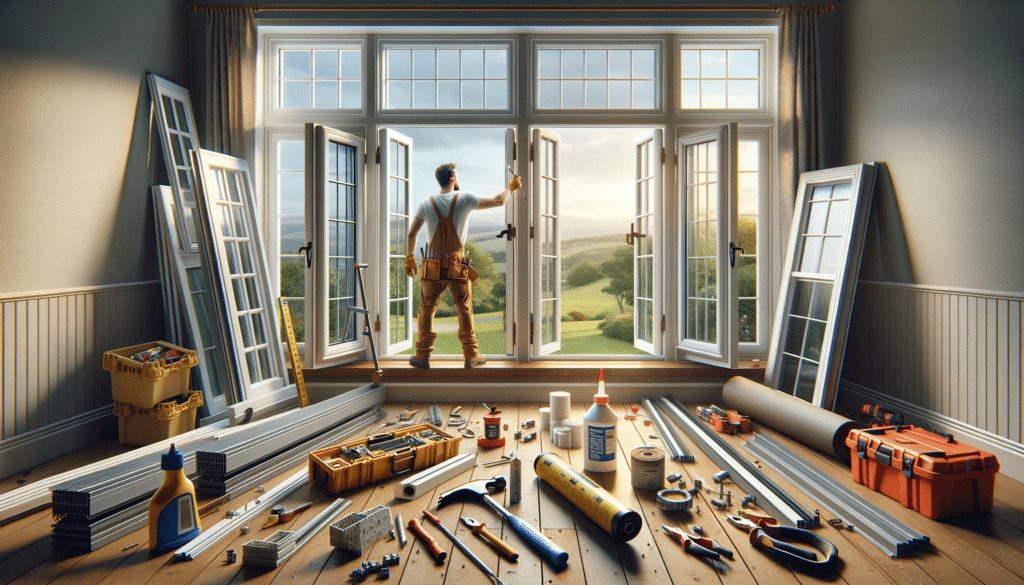The Importance of Window Replacement
Windows play a crucial role in the aesthetics, energy efficiency, and overall comfort of a home. Replacing old or damaged windows can significantly enhance the appearance and functionality of your living space. Modern windows offer improved insulation, which can lead to substantial savings on energy bills. With advancements in technology, window replacement has become an essential part of home renovation, providing both practical and aesthetic benefits.
Firstly, window replacement can improve the energy efficiency of your home. Older windows often have poor insulation, leading to heat loss in winter and heat gain in summer. By installing new, energy-efficient windows, homeowners can reduce their reliance on heating and cooling systems, resulting in lower energy consumption and cost savings.
Secondly, window replacement can enhance the aesthetic appeal of a home. New windows can transform the look of a house, giving it a fresh and modern appearance. With a wide range of styles and materials available, homeowners can choose windows that complement their home’s design and architecture.
Furthermore, replacing windows can improve the security and safety of a home. Modern windows come with advanced locking systems and durable materials, providing better protection against intruders and harsh weather conditions. This added security can offer peace of mind to homeowners.
Types of Windows for Replacement
When considering window replacement, it’s important to understand the different types of windows available. Each type has its own set of features, benefits, and aesthetic appeal. Here are some popular options:
- Double-Hung Windows: Known for their classic appearance, these windows have two sashes that move up and down, offering excellent ventilation.
- Casement Windows: Hinged at the side, these windows open outward, providing unobstructed views and superior ventilation.
- Sliding Windows: These windows slide horizontally, making them ideal for spaces with limited vertical clearance.
- Bay and Bow Windows: Extending outward, these windows create additional space inside the home and offer panoramic views.
- Awning Windows: Hinged at the top, they open outward, allowing ventilation even during light rain.
Choosing the right type of window depends on various factors, including the architectural style of the home, personal preferences, and budget. Consulting with a professional can help homeowners make informed decisions.
Factors to Consider When Replacing Windows
Window replacement is a significant investment, and several factors should be considered to ensure the best results. Here are some key considerations:
Material: Windows are available in various materials, including wood, vinyl, aluminum, and fiberglass. Each material has its own advantages and disadvantages. For example, wood offers a traditional look but requires more maintenance, while vinyl is low-maintenance and cost-effective.
Energy Efficiency: Look for windows with energy-efficient features, such as double or triple glazing, low-E coatings, and gas fills. These features can significantly reduce energy consumption and improve comfort.
Installation: Proper installation is crucial for the performance and longevity of windows. Hiring a professional installer ensures that windows are fitted correctly, preventing air leaks and water infiltration.
Budget: Window replacement costs can vary widely based on the type of window, material, and installation. It’s important to set a realistic budget and explore financing options if necessary.
The Process of Window Replacement
Understanding the window replacement process can help homeowners prepare for the project and ensure a smooth experience. Here’s a step-by-step guide:
Assessment: The first step is to assess the current condition of the windows and determine the need for replacement. This involves checking for drafts, condensation, and visible damage.
Selection: Once the need for replacement is confirmed, the next step is to select the type and style of windows. Consider factors such as energy efficiency, aesthetics, and functionality.
Measurement: Accurate measurements are crucial for a successful installation. Professionals will measure the window openings to ensure a perfect fit.
Installation: During installation, the old windows are removed, and the new ones are fitted. Proper sealing and insulation are essential to prevent air leaks and ensure energy efficiency.
Finishing: After installation, finishing touches such as caulking and painting are applied to enhance the appearance and performance of the windows.
Benefits of Professional Window Replacement Services
While some homeowners may consider DIY window replacement, hiring a professional service offers numerous advantages:
- Expertise: Professionals have the knowledge and experience to handle various types of windows and installation challenges.
- Quality Assurance: Professional services often come with warranties, ensuring peace of mind and protection against defects.
- Time Efficiency: Professionals can complete the job efficiently, minimizing disruption to the household.
- Safety: Window replacement can be hazardous, especially for multi-story homes. Professionals have the tools and safety equipment to handle the job safely.
Overall, professional window replacement services provide a hassle-free experience and ensure high-quality results.





